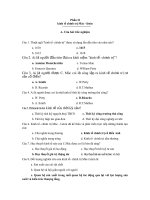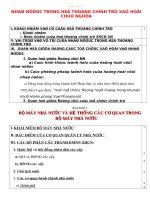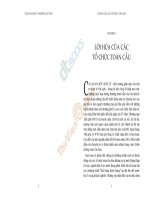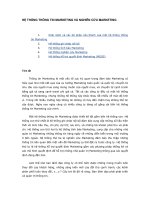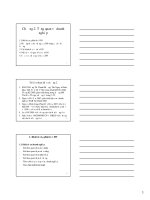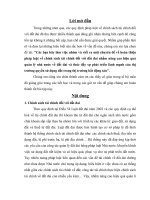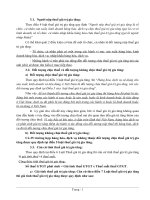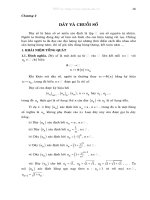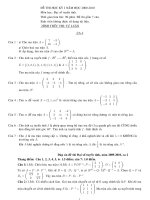PASSAGE 2
Bạn đang xem bản rút gọn của tài liệu. Xem và tải ngay bản đầy đủ của tài liệu tại đây (62.79 KB, 3 trang )
PASSAGE 2
Staggering tasks confronted the people of the United States, North and South, when the Civil War
ended. About a million and a half soldiers from both sides had to be demobilized, readjusted to civilian
life, and reabsorbed by the devastated economy. Civil government also had to be put back on a peacetime
basis and interference from the military had to be stopped.
The desperate plight of the South has eclipsed the fact that reconstruction had to be undertaken also in
the North, though less spectacularly. Industries had to adjust to peacetime conditions; factories had to be
retooled for civilian needs.
Financial problems loomed large in both the North and the South. The national debt had shot up from a
modest $65 million in 1861, the year the war started, to nearly $3 billion in 1865, the year the war ended.
This was a colossal sum for those days but one that a prudent government could pay. At the same time,
was taxes had to be reduced to less burdensome levels.
Physical devastation caused by invading armies, chiefly in the South and border states, had to be
repaired. This Herculean task was ultimately completed but with discouraging slowness.
Other important questions needed answering. What would be the future of the four million black
people who were freed from slavery? On what basis were the Southern states to be brought back into the
Union?
What of the Southern leaders, all of whom were liable to charges of treason? One of these leaders,
Jefferson Davis, President of the Southern Confederacy, was the subject of an insulting popular Northern
song, “Hang Jeff Davis from a Sour Apple Tree.” And even children sang it. Davis was temporarily
chained in his prison cell during the early days of his two-year imprisonment. But he and the other
Southern leaders were finally released, partly because it was unlikely that a jury from Virginia, a Southern
Confederate state, would convict them. All the reconstruction efforts proceed with as little bitterness as
possible.
Question 1. What does the passage mainly discuss?
A. Wartime expenditures.
B. Problem facing the United States after the war.
C. Methods of repairing the damage caused by the war.
D. The results of government efforts to revive the economy.
Question 2. The word “Staggering” in line 1 is closest in meaning to ___________.
A. specialized
B. confusing
C. various
D. overwhelming
Question 3. The word “devastated” is closest in meaning to ___________.
A. developing
B. ruined
C. complicated
D. fragile
Question 4. According to the passage, which of the following statements about the damage in the South is
correct?
A. It was worse than in the North.
B. The cost was less than expected.
C. It was centered in the border states.
D. It was remedied rather quickly.
Question 5. The passage refers to all of the following as necessary steps following the Civil War
EXCEPT ____________.
A. Helping soldiers readjust
B. Restructuring industry
C. Returning government to normal
D. Increasing taxes
Page 1
Question 6. The word “task” refers to ____________.
A. Rasing the tax level
B. Sensible financial choices
C. Worse decisions about former slaves
D. Reconstruction of damaged areas
Question 7. Why does the author mention a popular song in the South?
A. To give attitude towards the South
B. To illustrate the Northern love of music
C. To emphasize the cultural differences between the North and the South
D. To compare the Northern and Southern presidents
Question 8. Which of the following can be inferred from the phrase “…it was unlikely that a jury from
Virginia, a Southern Confederate state, would convict them’?
A. Virginians felt betrayed by Jefferson Davis.
B. A popular song insulted Virginians.
C. Virginians were loyal to their leaders.
D. All of the Virginia military leaders had been put in chains.
Question 9. The word “them” refers to _____________.
A. charges
B. leaders
C. days
D. irons
Question 10. It can be inferred from the passage that President Johnson pardoned the Southern leaders in
order to _____________.
A. Raise money for the North
B. Repair the physical damage in the South
C. Prevent Northern leaders from punishing more Southerners
D. Help the nation recover from the war
ĐÁP ÁN
1-B
2-D
3-B
4-A
5-D
6-D
7-A
8-C
9-B
10-D
LỜI GIẢI CHI TIẾT
Question 1:
Problem facing the United States after the war. = các vấn đề diễn ra ở nước Mỹ sau chiến tranh
Question 2:
overwhelming = lấn át
Question 4:
It was worse than in the North
Thông tin ở đoạn sau: “The desperate plight of the South has eclipsed the fact that reconstruction had to
be undertaken also in the North, though less spectacularly. Industries had to adjust to peacetime
conditions; factories had to be retooled for civilian needs.”
(Hoàn cảnh vô vọng của miền Nam đã che khuất đi một thực tế là sự tái thiết phải được tiến hành ở cả
miền Bắc nữa, cho dung ít rõ rệt hơn. Các ngành phải điều chỉnh lại về tình hình thời bình; các nhà máy
phải được tái hoạt động đáp ứng nhu cầu người dân.)
Page 2
Question 5:
Increasing taxes
Thông tin ở đoạn sau: “Civil government also had to be put back on a peacetime basis and interference
from the military had to be stopped.”
(Chính phủ trong nước cịn phải được đưa trở về thời bình và những can thiệp từ quân đội phải được
chấm dứt.) “Industries had to adjust to peacetime conditions; factories had to be retooled for civilian
needs.” (Các ngành phải điều chỉnh lại về tình hình thời bình; các nhà máy phải được tái hoạt động đáp
ứng nhu cầu người dân.)
Question 6:
Reconstruction of damaged areas
Thông tin ở đoạn sau: “Physical devastation caused by invading armies, chiefly in the South and border
states, had to be repaired. This Herculean task was ultimately completed but with discouraging slowness.
(Sự kiệt quệ về thể chất do quân đội xâm lược, chủ yếu ở miền Nam và các bang thuộc biên giới cần phải
được sửa chữa. Nhiệm vụ tái thiết nặng nề này đã hoàn thành về cơ bản với sự chậm trễ đáng thất vọng.)
Question 7:
To give attitude towards the South.
Thông tin ở đoạn sau: “One of these leaders, Jefferson Davis, President of the Southern Confederacy, was
the subject of an insulting popular Northern song, “Hang Jeff Davis from a Sour Apple Tree.” And even
children sang it. Davis was temporarily chained in his prison cell during the early days of his two-year
imprisonment. But he and the other Southern leaders were finally released, partly because it was unlikely
that a jury from Virginia, a Southern Confederate state, would convict them. All the reconstruction efforts
proceed with as little bitterness as possible.”
(Một trong những nhà lãnh đạo này, Jefferson Davis, thống đốc liên bang miền Nam, là chủ đề của một ca
khúc phê phán nổi tiếng ở miền Bắc. “Hang Jeff Davis from a Sour Apple Tree” . Và thậm chí lũ trẻ đã
hát nó. Davis đã bị giam tạm thời trong suốt những ngày đầu của 2 năm đi tù của mình. Nhưng ơng và
những nhà lãnh đạo miền Nam cuối cùng đã được thả, một phần là vì đó có vẻ khơng phải là ban hội thẩm
từ Virginia, một lien bang ở miền Nam, đã kết án họ. Mọi nỗ lực tái thiết đã diễn ra ít cay đắng nhất có
thể.)
Question 8:
Virginia were loyal to their leaders
Thông tin ở đoạn sau: “But he and the other Southern leaders were finally released, partly because it was
unlikely that a jury from Virginia, a Southern Confederate state, would convict them.”
(Nhưng ông và những nhà lãnh đạo miền Nam cuối cùng đã được thả, một phần là vì đó có vẻ khơng phải
là ban hội thẩm từ Virginia, một lien bang ở miền Nam, đã kết án họ.)
Question 9:
leaders = các nhà lãnh đạo
Question 10:
Help the nation recover from the war. = giúp đất nước tái thiết từ chiến tranh
Page 3
